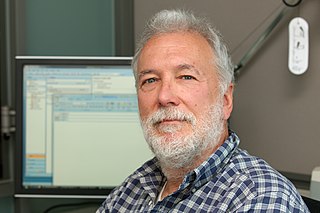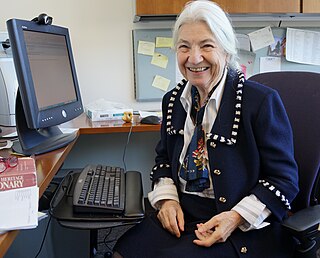Related Research Articles

John Edward Hopcroft is an American theoretical computer scientist. His textbooks on theory of computation and data structures are regarded as standards in their fields. He is a professor emeritus at Cornell University, co-director of the Center on Frontiers of Computing Studies at Peking University, and the director of the John Hopcroft Center for Computer Science at Shanghai Jiao Tong University.

John Leroy Hennessy is an American computer scientist who is chairperson of Alphabet Inc. (Google). Hennessy is one of the founders of MIPS Technologies and Atheros, and also the tenth President of Stanford University. Hennessy announced that he would step down in the summer of 2016. He was succeeded as president by Marc Tessier-Lavigne. Marc Andreessen called him "the godfather of Silicon Valley."

Jack Joseph Dongarra is an American computer scientist and mathematician. He is the American University Distinguished Professor of Computer Science in the Electrical Engineering and Computer Science Department at the University of Tennessee. He holds the position of a Distinguished Research Staff member in the Computer Science and Mathematics Division at Oak Ridge National Laboratory, Turing Fellowship in the School of Mathematics at the University of Manchester, and is an adjunct professor and teacher in the Computer Science Department at Rice University. He served as a faculty fellow at the Texas A&M University Institute for Advanced Study (2014–2018). Dongarra is the founding director of the Innovative Computing Laboratory at the University of Tennessee. He was the recipient of the Turing Award in 2021.

Barbara Liskov is an American computer scientist who has made pioneering contributions to programming languages and distributed computing. Her notable work includes the introduction of abstract data types and the accompanying principle of data abstraction, along with the Liskov substitution principle, which applies these ideas to object-oriented programming, subtyping, and inheritance. Her work was recognized with the 2008 Turing Award, the highest distinction in computer science.

Charles Patrick "Chuck" Thacker was an American pioneer computer designer. He designed the Xerox Alto, which is the first computer that used a mouse-driven graphical user interface (GUI).
Scott J. Shenker is an American computer scientist, and professor of computer science at the University of California, Berkeley. He is also the leader of the Extensible Internet Group at the International Computer Science Institute in Berkeley, California.

Jeffrey Peter Buzen is an American computer scientist in system performance analysis best known for his contributions to queueing theory. His PhD dissertation and his 1973 paper Computational algorithms for closed queueing networks with exponential servers have guided the study of queueing network modeling for decades.
Randy Howard Katz is a distinguished professor emeritus at University of California, Berkeley of the electrical engineering and computer science department.
Elaine Jessica Weyuker is an ACM Fellow, an IEEE Fellow, and an AT&T Fellow at Bell Labs for research in software metrics and testing as well as elected to the National Academy of Engineering. She is the author of over 130 papers in journals and refereed conference proceedings.

James Richard "Jim" Goodman retired as professor of computer science at the University of Auckland in Auckland, New Zealand, and emeritus professor at the University of Wisconsin–Madison.
David Ethan Culler is a computer scientist and former chair of the Department of Electrical Engineering and Computer Sciences at the University of California, Berkeley. He is a principal investigator in the Software Defined Buildings (SDB) project at the EECS Department at Berkeley and the faculty director of the i4Energy Center. His research addresses networks of small, embedded wireless devices, planetary-scale internet services, parallel computer architecture, parallel programming languages, and high performance communication. This includes TinyOS, Berkeley Motes, PlanetLab, Networks of Workstations (NOW), Internet services, Active Message, Split-C, and the Threaded Abstract Machine (TAM).

Ruzena Bajcsy is an American engineer and computer scientist who specializes in robotics. She is professor of electrical engineering and computer sciences at the University of California, Berkeley, where she is also director emerita of CITRIS.
Edward S. Davidson is a professor emeritus in Electrical Engineering and Computer Science at the University of Michigan, Ann Arbor.
The Seymour Cray Computer Engineering Award, also known as the Seymour Cray Award, is an award given by the IEEE Computer Society, to recognize significant and innovative contributions in the field of high-performance computing. The award honors scientists who exhibit the creativity demonstrated by Seymour Cray, founder of Cray Research, Inc., and an early pioneer of supercomputing. Cray was an American electrical engineer and supercomputer architect who designed a series of computers that were the fastest in the world for decades, and founded Cray Research which built many of these machines. Called "the father of supercomputing," Cray has been credited with creating the supercomputer industry. He played a key role in the invention and design of the UNIVAC 1103, a landmark high-speed computer and the first computer available for commercial use.
The Ken Kennedy Award, established in 2009 by the Association for Computing Machinery and the IEEE Computer Society in memory of Ken Kennedy, is awarded annually and recognizes substantial contributions to programmability and productivity in computing and substantial community service or mentoring contributions. The award includes a $5,000 honorarium and the award recipient will be announced at the ACM - IEEE Supercomputing Conference.
Robert W. Brodersen was a professor emeritus of electrical engineering, and a founder of the Berkeley Wireless Research Center (BWRC) at the University of California, Berkeley.

Jitendra Malik is an Indian-American academic who is the Arthur J. Chick Professor of Electrical Engineering and Computer Sciences at the University of California, Berkeley. He is known for his research in computer vision.

Oyekunle Ayinde "Kunle" Olukotun is a British-born Nigerian computer scientist who is the Cadence Design Systems Professor of the Stanford School of Engineering, Professor of Electrical Engineering and Computer Science at Stanford University and the director of the Stanford Pervasive Parallelism Lab. Olukotun is known as the “father of the multi-core processor”, and the leader of the Stanford Hydra Chip Multiprocessor research project. Olukotun's achievements include designing the first general-purpose multi-core CPU, innovating single-chip multiprocessor and multi-threaded processor design, and pioneering multicore CPUs and GPUs, transactional memory technology and domain-specific languages programming models. Olukotun's research interests include computer architecture, parallel programming environments and scalable parallel systems, domain specific languages and high-level compilers.
Mark D. Hill is a computer scientist and professor at the University of Wisconsin–Madison. He has been cited over 27,000 times.
Norman Paul Jouppi is an American electrical engineer and computer scientist.
References
- ↑ "ACM Fellows Award". Archived from the original on 14 December 2007. Retrieved 2008-01-20.
- ↑ "Michelson Award Winners". Archived from the original on 2008-04-20. Retrieved 2008-01-20.
- ↑ "Past recipients for Harry H. Goode Memorial Award". Archived from the original on 2014-07-07. Retrieved 2008-01-20.
- ↑ "6th USENIX Conference on File and Storage Technologies (FAST '08)". Archived from the original on 24 January 2008. Retrieved 2008-01-20.